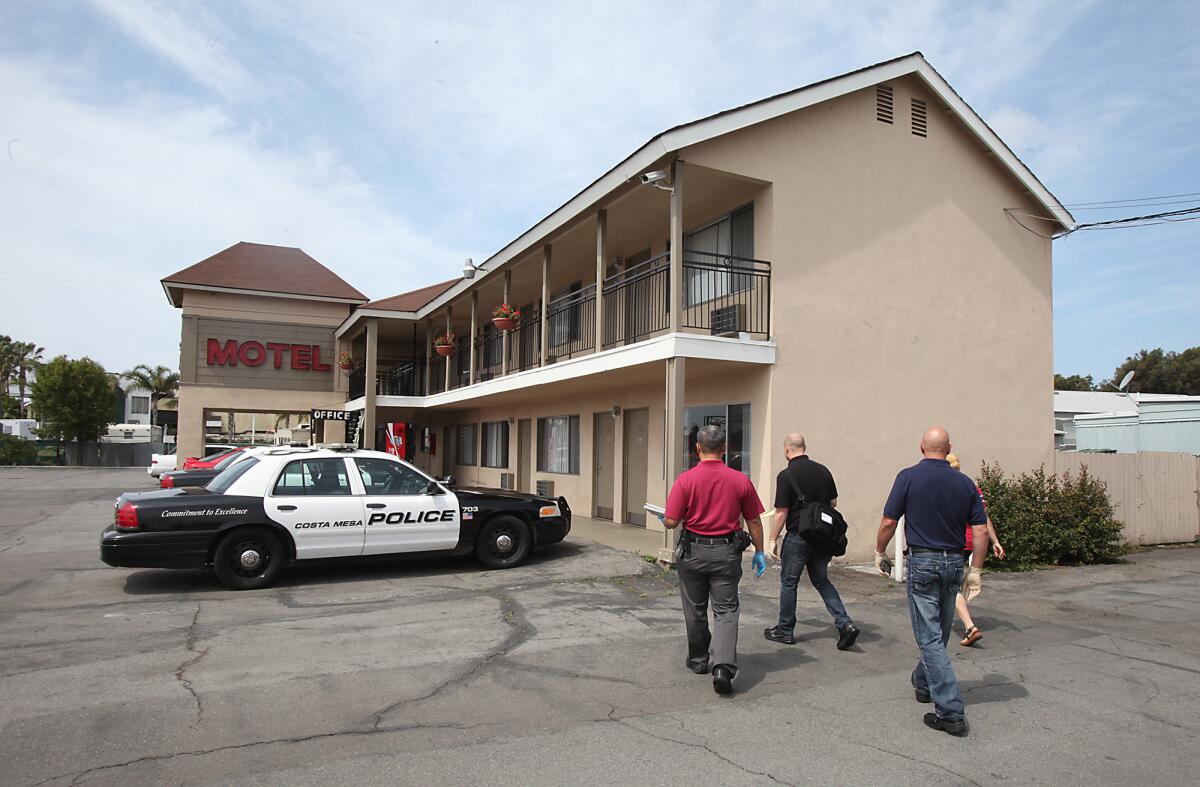Costa Mesa considers billing motels for police

- Share via
At a meeting this week, Costa Mesa city officials discussed one of the latest attempts to address excessively problematic motels: charging them for the trouble.
On Tuesday night, four members of the City Council — Councilwoman Wendy Leece left the meeting early — heard about a proposed ordinance that would help the city recover the public safety costs associated with motels that have disproportionately high crime rates.
The “excessive use of resources” ordinance could be a “good first start” toward giving motel owners more accountability for what happens on their properties, said Rick Francis, assistant city CEO.
“In a sense, this is a way to get motel owners to be a little bit more responsible and responsive to solving their own problems and not having our Police Department act, literally, as a security guard for their issues,” he said.
Under the ordinance, a threshold would be in place giving motels a defined number of service calls for specific crimes — including serious or violent felonies, underage drinking, drugs and gang-related crime — before the city starts billing them directly.
How much would be billed, however, is still being worked out, according to city staff.
Mayor Jim Righeimer called the enforcement a form of “tough love” for businesses that shouldn’t be subsidized by taxpayers.
Councilwoman Sandy Genis asked about the ordinance applying not just to motels, but hotels, such as Westin South Coast Plaza.
Righeimer replied that those higher-end properties, which attract a more upscale clientele, do not incur the high amount of police calls that many motels typically do.
“There’s a gap that’s so big,” he said. “They’re just not even close.”
Councilman Gary Monahan suggested a method that could track more high-priority police calls, given that there’s a “whole different world” between murders or stabbings and marijuana use or underage drinking.
Genis concurred with Monahan, saying that the ordinance includes “everything from disturbing the peace to commission of a felony.”
Mayor Pro Tem Steve Mensinger said the issue is similar to some he faced while managing apartment complexes.
“It was always a big issue not to lease or rent to folks that would have these types of problems,” he said. “It’s a disproportionate use of services in that community, and that just wasn’t a great thing to do.”
Some members of the public agreed with the idea of tackling problematic motels, but had some reservations.
“I think it should apply to all businesses that provide lodging,” said resident Beth Refakes. “By singling out motels, you’re making it a little too complicated.”
She suggested the ordinance extending to other types of businesses.
Mike Lin, owner of the Sandpiper Motel, said motel managers don’t have control over when their guests may call the police, and that motel properties often serve low-income people, including families, who have nowhere else to go.
“It is the nature of the business that motels serve those people,” Lin said.
He added that the city should be encouraging calls to police, not discouraging them, so that public safety officials may help avoid tragedies from occurring.
The Sandpiper, 1967 Newport Blvd., is one of two motels in Costa Mesa that the Planning Commission will be exploring Nov. 12. The five-member commission will be examining the roughly 45-room motel’s operating permit.
